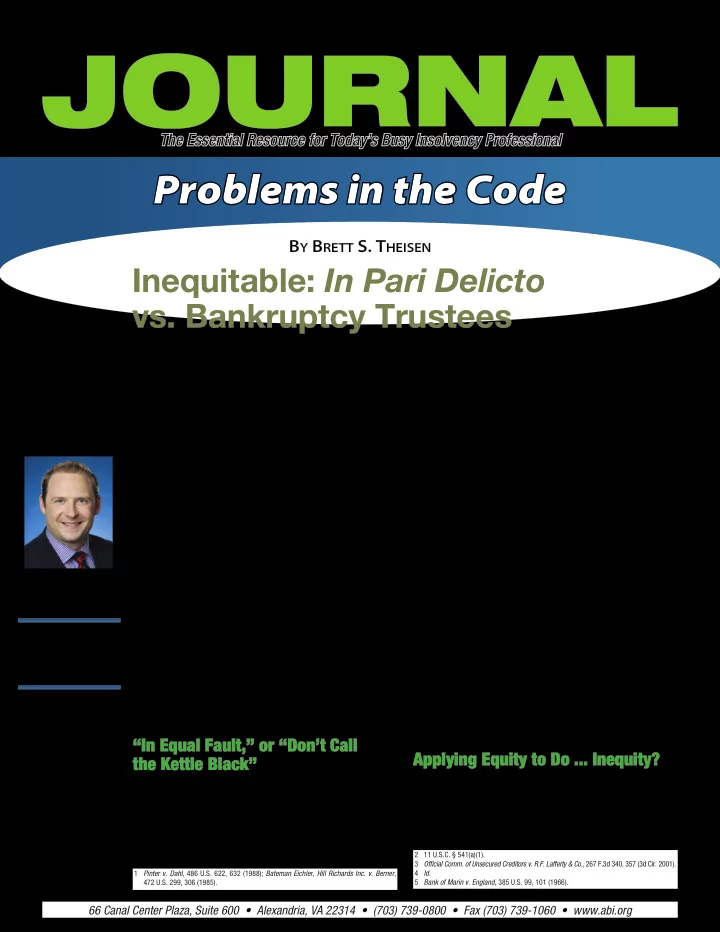

66CanalCenterPlaza,Suite600•Alexandria,VA22314•(703)739-0800•Fax(703)739-1060•www.abi.org GibbonsPC Newark,N.J. GibbonsPCin anassociatewith BrettTheisenis Newark,N.J. The Essential Resource for Today’s Busy Insolvency Professional Problems in the Code B Y B RETT S. T HEISEN Inequitable: In Pari Delicto vs. Bankruptcy Trustees E nron . Madoff . Stanford . These cases evoke should not lend their offjces to mediating disputes the same set of rotten facts: a company in among wrongdoers, and (2) denying judicial relief bankruptcy, investor funds missing and exec- to wrongdoers will effectively deter illegality. In utives indicted. Creditors swarm, and a bankruptcy essence, in pari delicto tells wrongdoers that the trustee is appointed to recover whatever assets can courts will not countenance fjnger-pointing between be found. In all likelihood, recoveries will be pen- similarly culpable parties. nies on the dollar. The in pari delicto doctrine is frequently But then, a new fact comes to light: The com- invoked in bankruptcy litigation when a trustee pany’s auditor was negligent in detecting the fraud. seeks to hold defendants liable for conduct that is For years, and despite countless red fmags, the audi - related to a debtor’s pre-petition fraud. Defendants tor allegedly failed to follow basic auditing stan- raise in pari delicto as a defense to any recovery for dards and issued one clean audit report after anoth- the estate, blaming damages on the wrongful acts er. As a result, investors continued to pour money of the debtor’s principals, which are imputed to into the company, only to have it vanish. the debtor itself. A bankruptcy fjling establishes an Intuitively, what comes next seems obvious: estate consisting of “all legal or equitable interests Courts ought to hold the auditor liable for its role of the debtor in property as of the commencement of in the fraud, and order damages to be paid to the bankruptcy.” 2 A debtor’s claims held by the estate Brett S. Theisen bankruptcy estate for the benefjt of creditors. Yet are “no stronger than they [would be] when actually almost without exception, the auditor in such held by the debtor.” 3 Thus, even if an estate assigns cases escapes liability to the trustee for its negli- the debtor’s claims to an innocent trustee, the trustee gence under the in pari delicto doctrine. Such out- does not take greater rights than the debtor had in comes have no basis in equity or common sense, those claims. 4 In other words, a trustee assumes the and distort the fundamental principles underlying debtor’s causes of action and is subject to what- bankruptcy law. This article summarizes existing ever defenses exist against the debtor. 5 Therefore, case law and highlights a new way of thinking most courts of appeals have held that in pari delicto about the in pari delicto defense when it is raised may bar a trustee’s claims based on § 541 (a) of the against trustees. Bankruptcy Code, even though the trustee acts for the benefjt of defrauded creditors. “In Equal Fault,” or “Don’t Call Applying Equity to Do ... Inequity? the Kettle Black” Section 541 (a) (1) provides that a bankruptcy In pari delicto (short for in pari delicto poti- estate includes a debtor’s causes of action, subject or est conditio defendentis , which means that “if to whatever defenses may attach. Such claims and both (parties) are in the wrong, the position of the defenses are normally defined by state law, and defendant is the stronger”) is a judge-made, affjr - courts cannot ignore valid state law defenses in mative defense rooted in principles of equity. 1 Two major concepts underlie this doctrine: (1) Courts 2 11 U.S.C. § 541(a)(1). 3 OffjcialComm.ofUnsecuredCreditorsv.R.F.Lafferty&Co. , 267 F.3d 340, 357 (3d Cir. 2001). 1 Pinterv.Dahl , 486 U.S. 622, 632 (1988); BatemanEichler,HillRichardsInc.v.Berner , 4 Id . 472 U.S. 299, 306 (1985). 5 BankofMarinv.England , 385 U.S. 99, 101 (1966).
Recommend
More recommend